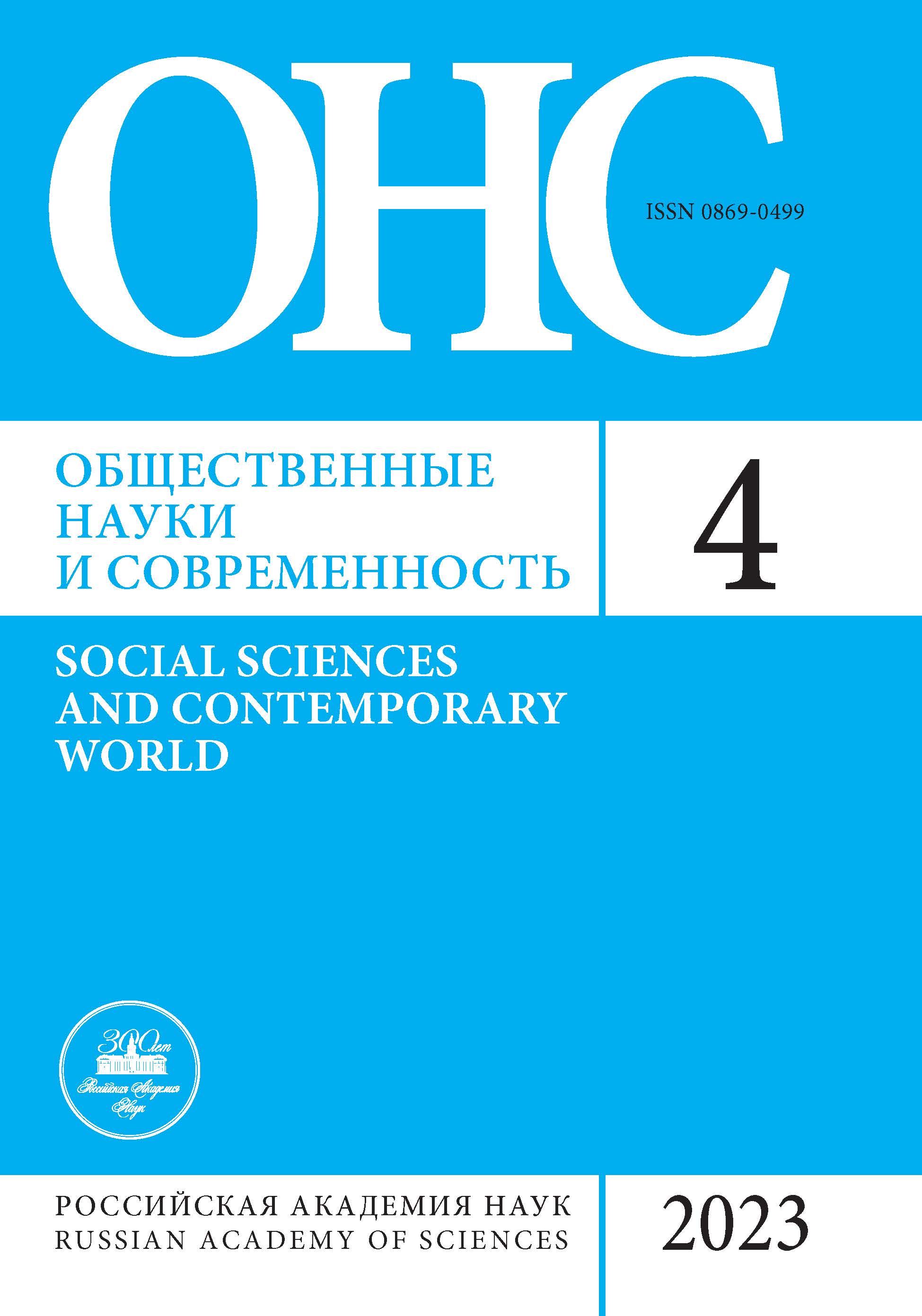Sovereignty as a way out of collective anxiety: the EU’s discourse on money, health, and food
- Авторлар: Romanova T.A.1, Kotsur G.V.1
-
Мекемелер:
- Saint Petersburg State University
- Шығарылым: № 4 (2023)
- Беттер: 68-80
- Бөлім: Articles
- URL: https://kazanmedjournal.ru/0869-0499/article/view/675172
- DOI: https://doi.org/10.31857/S0869049923040056
- EDN: https://elibrary.ru/OXYQSR
- ID: 675172
Дәйексөз келтіру
Аннотация
The European Union (EU) has developed as an actor that overcomes national sovereignty in global politics. Yet, as of 2017, the EU has used the “sovereignty” category at the supranational level, both in general and in combination with “sectoral” adjectives. The objective of research is to demonstrate that the use of “sectoral sovereignty” can be examined as the EU’s work with collective anxiety, which results from various challenges that can hardly be controlled. The anxiety is examined in the context of emotion culture with the focus on public images of sentiments whereas the incorporation of sovereignty in the EU’s discourse comes out as a “self-identification with an aggressor” - with something that has previously been viewed as a threat to integration. In the EU’s discourse “sovereignty” means a set of actions targeted at drawing a border between the internal and the external, at establishing higher autonomy. Three cases are examined with the help of discourse analysis: challenge of technological companies and monetary sovereignty; pandemic threat and health sovereignty; problems in global agricultural trade and food sovereignty. In each case elements of the EU’s collective anxiety are described; sovereignty as a system of actions to address anxiety is identified; the overall support for this work in the EU is revealed. The conclusions are drawn on when and where “sectoral” sovereignty helps the EU to limit its anxiety. Yet, the successful incorporation of sovereignty in the EU’s discourse does not mean a complete overcoming of anxiety; instead, dialectic relations between collective anxiety and sovereignty emerge.
Негізгі сөздер
Авторлар туралы
Tatiana Romanova
Saint Petersburg State University
Email: t.romanova@spbu.ru
St. Petersburg, Russia
Gleb Kotsur
Saint Petersburg State University
Email: glebk17@gmail.com
St. Petersburg, Russia
Әдебиет тізімі
- Зорин А. (2016) Появление героя: из истории русской эмоциональной культуры конца XVIII-начала XIX века. М: Новое Литературное Обозрение. 568 с.
- Плампер Я. (2018) История эмоций. М.: Новое литературное обозрение. 561 c.
- Романова Т.А. (2021) Дискурс о суверенитете Европейского союза: содержание и последствия // Современная Европа. № 5. С. 32-44.
- Фрейд А. (1993) Психология "Я" и защитные механизмы. М.: Педагогика. 144 с.
- Agnew J. (2018) Globalization and Sovereignty. Beyond the Territorial Trap. 2nd Ed. Lanham: Rowman & Littlefield. 279 p.
- Bartelson J. (1995) A Genealogy of Sovereignty. Cambridge: Cambridge University Press. 317 p.
- Bodin J. (1962) Six Books on the Commonwealth. Oxford: Basil Backwell. 256 p.
- Collins R. (2004) Interaction Ritual Chains. Princeton: Princeton University Press. 464 p.
- Crawford N.C. (2014) Institutionalizing Passion in World Politics: Fear and Empathy // International Theory. Vol. 6. No. 3. Pp. 535-557.
- Epstein S. (1972) The Nature of Anxiety with Emphasis upon its Relationship to Expectancy. In: Anxiety: Current Trends in Theory and Research. Vol. 2. Ed(s): C. D. Spielberger. New York: Academic Press. Pp. 291-337.
- Frankel J. (2002) Exploring Ferenczi's Concept of Identification with the Aggressor: Its Role in Trauma, Everyday Life, and the Therapeutic Relationship // Psychoanalytic Dialogues. Vol. 12. No. 1. Pp. 101-139.
- Geertz С. (1973) The Interpretation of Cultures. New York: Basic Books. 470 p.
- Jacobsen K. (2013) Why Freud Matters: Psychoanalysis and International Relations Revisited // International Relations. Vol. 27. No. 4. Pp. 393-416.
- Koschut S. (2017) The Structure of Feeling - Emotion Culture and National Self-Sacrifice in World Politics // Millennium. Vol. 45. No. 2. Pp. 174-192.
- Kövecses Z. (2003) Metaphor and Emotion: Language, Culture, and Body in Human Feeling. Cambridge: Cambridge University Press. 223 p.
- Laclau E., Mouffe C. (2001) Hegemony and Socialist Strategy: Towards a Radical Democratic Politics. London: Verso. 217 p.
- MacCormick N. (1999) Questioning Sovereignty: Law, State, and Nation in the European Commonwealth. Oxford: Oxford University Press. 210 p.
- MacLeod C., Rutherford E.M. (1992) Anxiety and the Selective Processing of Emotional Information: Mediating Roles of Awareness, Trait and State Variables, and Personal Relevance of Stimulus Materials // Behaviour Research and Therapy. Vol. 30. No. 5. Pp. 479-491.
- Nussbaum M.C. (2016) Anger and Forgiveness: Resentment, Generosity, Justice. Oxford: Oxford University Press. 315 p.
- Sylvers P., Lilienfeld S.O., LaPrairie J.L. (2011) Differences between Trait Fear and Trait Anxiety: Implications for Psychopathology // Clinical Psychology Review. Vol. 31. No. 1. Pp. 122-137.
- Wæver O. (1996) European Security Identities // Journal of Common Market Studies. Vol. 34. No. 1. Pp. 103-132.
- Walker N. (2003) Late Sovereignty in the European Union. In: Sovereignty in Transition. Ed(s): N. Walker. Oxford: Hart. Pp. 3-32.
- Weber C. (1995) Simulating Sovereignty: Intervention, the State and Symbolic Exchange. Cambridge: Cambridge University Press. 298 p.
- Wendt A. (2004) The State as Person in International Theory // Review of International Studies. Vol. 30. No. 2. Pp. 289-316.
Қосымша файлдар









